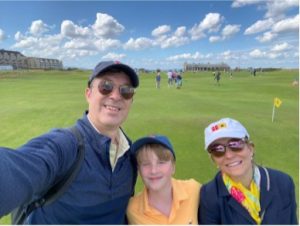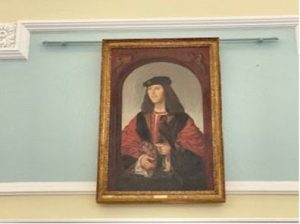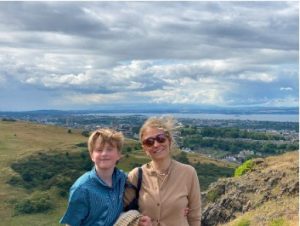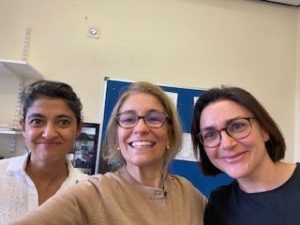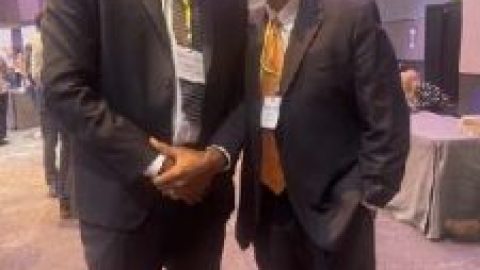Vassiliki Liana Tsikitis MD MCR MBA 2022 James IV Travelling Fellow
I am deeply grateful for the privilege of being selected as the James IV Surgical Association Traveling Fellow from the United States for 2022. I want to particularly thank Dr. John Hunter for his sponsorship and support for this unique opportunity. Due to the COVID pandemic I delayed my travel experience to the spring of 2023 and summer of 2024.
My travels took me across the United Kingdom in the summer of 2023, visiting cities including London, Manchester Leeds, and Edinburgh. In the spring of 2024, I embarked on the second leg of my fellowship, traveling to Australia (Melbourne and Sydney) and New Zealand (Auckland). This schedule allowed me to align part of my trips with my family’s time off, which added to the experience as I made lifelong connections not only with colleagues but also with their families.
My primary goal as a James IV Traveling Fellow was to observe how surgeons in different countries, with varying healthcare systems and cultural and political challenges, assess the quality of surgical care and promote the highest patient care standards. As a colorectal surgeon, I also aimed to learn how the ever-evolving paradigms of colorectal cancer are practiced around the globe and how other providers and healthcare systems have safely implemented modern technologies. What I gained from the experience far exceeded these expectations. I had the opportunity to meet and learn from a wide array of professionals including colorectal surgeons, health care administrators and basic science researchers, attend the annual meeting of the Association of Coloproctology of Great Britain & Ireland. I was fortunate that my family was able to join me for significant portions of the trip and listened as I enthusiastically retold highlights from the morning while sightseeing in the afternoons and evenings. Sharing these experiences with my family made the journey truly unforgettable. The people I met and the insights I gained are impossible to fully capture in a few pages, but I will describe the highlights of my learnings.
UK Trip (London, Manchester, Leeds, and Edinburgh)
My choice to go to the UK was multifaceted. Serving as the head of a large multi-sectioned general surgery division, I have encountered the challenges of the current healthcare landscape in the United States. Nursing turnover and premium labor costs were the reality pre-COVID and became exacerbated to the point of near collapse by the COVID pandemic. We also know that high healthcare spending does not translate to best patient care. I
wanted to gain exposure to the practice of surgery in a universal health care system and
identified the UK’s National Health Service system as an excellent case study.
When I arrived in London, all the hospitals I had pre-arranged to visit were facing a strike threat from the house staff workforce. Although in 2019 the long-term plan of the NHS seemed to want to address the workforce problems, emphasizing “that the performance of any health care system ultimately depends on its people”, it failed to recognize that investment on their workforce incentivization, productivity, culture and advancement was instrumental. The trainees that I spoke to when I visited were failing to see the return on their investment with meager compensation that led to their difficulties “making ends meet”. During my second day in London, while visiting with Professor Ara Darzi, I attended the Hamlyn Symposium on Medical Robotics. The keynote speaker was Dr. Tim Ferris, the National Director of Transformation NHS England, and NHS Improvement. He discussed the government’s increased funding for the NHS to 3.4% from the previous 2.2 % and presented the updated NHS Five Year Forward View. He discussed how increasing the supply to meet the demand is not adequate to address workforce shortages. He discussed a multipronged approach to address the current workforce pressures including the expansion of clinical placements, establishing new routes into nursing and other disciplines, international recruitment, a set of incentives for hard-to-recruit geographies, and importantly “flexible rostering” and funding for continuing professional development to support current staff.
The idea of bringing agency and directing funding to local areas provoked my thinking about the possibility of state health care systems and reconfiguring the healthcare system according to the needs of the community as strategies to alleviate health inequalities.
Although the Forward View sought to separate patient care between family doctors and hospitals, between physical and mental health, and between health and social care, I witnessed a system with overwhelmed GPs each addressing hundreds of patients, unable to attend to them in a timely manner unless their patient was facing a significant health threat.
During my week in London my generous hosts in the city of London included Drs. Jamie Murphy, Ara Darzi, Amyn Haji and Simon Buczacki. I spent the first day observing cases with Dr. Murphy and his partner Dr. Chet Bhan. The opportunity to spend time together led to a fruitful collaboration and the three of us jointly organized sessions for the surgical meetings of the Society of Surgeons of the Alimentary Tract in Washington DC and the International Society for Digestive Surgery in Kuala Lumpur. The second day, I met with Professor Darzi and attended the Hamlyn Symposium of Robotics where innovative robotic platforms were introduced and discussed. Intuitive dominates the market in the US and the
opportunity for me to be exposed to other robotic platforms was encouraging for what the future may hold in the US. The third day I visited with Dr. Amyn Haji, who is the clinical lead for colorectal surgery and endoscopy at King’s College Hospital. I was impressed with the teaching facility and the curriculum he has developed on advanced endoscopic procedures. His trainees were gastroenterology fellows from all over the UK and Australia. I was able to spend the day observing, and later attending a state-of-the-art surgical endoscopy course that he organized during the ACPGBI meeting that took place the following week in Manchester.
I was impressed by the collaborative spirit between gastroenterology and colorectal surgery units. Based on the introduction and person-to-person time made possible by my James IV fellowship, I was privileged to invite Dr. Haji to be a speaker at the combined clinical symposium during Digestive Disease Week 2024 in Washington DC, where they spoke on the management of malignant colorectal polyps and the role of endoscopic submucosal dissection. I consider myself fortunate to have established long-lasting collaborations with Drs. Murphy, Bhan and Haji and I am excited for the next projects we will work on together.
The next couple of days I spent in Cambridge visiting a research colleague with whom I had previously collaborated, Dr. Sarah Bohndiek, based at Corpus Christi College. Together we obtained a CRUK grant on the role of hyperspectral endoscopy (HySE) system and its ability to differentiate malignant versus benign polyps of the colon and rectum. It was a wonderful visit that coincided with the college’s graduation; it was a special treat to attend the graduation ceremony.
The next day I visited Oxford and met with Professor Simon Buczacki and the colorectal surgery team including Ms. Kat Baker, Mr. Bruce George, Mr. David James, and Mr. Nicholas Symon. We had a round table discussion on total neoadjuvant treatment for locally advanced rectal cancer and I attended their monthly mortality and morbidity conference. I was impressed with Dr. Buczacki’ s basic science research on genetic and non-genetic clonal diversity in colorectal cancer; the role of copy number variations that give rise to intratumoral heterogeneity that may partly explain how targeted chemotherapy agents for certain mutations, effective initially against the disease, lose their effectiveness overtime. This was the conclusion of my first week in the UK, focusing on London and the surrounding areas.
The next week was split between Manchester and Leeds. In Manchester I attended the ACPGBI (The Association of Coloproctology of Great Britain and Ireland) conference, where
I re-connected with several people I met in London, and had my initial meeting with my next hosts, Professor Peter Sagar, and Dr. Jim Tiernan with St James Hospital in Leeds.
My visit at Leeds’s internationally famous St James Hospital, where I spent three days observing complex pelvic exenteration and resection of advanced rectal and anal squamous cancers, in my mind was the epitome of where the NHS system showed how it can be an efficient and equitable health care system, providing cost effective, coordinated, and patient-centered care.
Professor Sagar has built a remarkable colorectal unit, where referrals for all advanced pelvic cancers within Great Britain and Ireland are sent, and patients receive timely multidisciplinary care. There is a colorectal management unit composed of administrative staff that process hundreds of referrals according to acuity and direct them to the right provider teams. Patients are presented in a weekly multidisciplinary board where steps of care are decided, and nurse navigators assist patients through the sequence of the treatment arms deemed necessary. What I witnessed in Leeds is a center of excellence supported by the NHS where all healthcare providers, including surgeons, physicians, and support staff with extensive experience and specialized training, all follow the latest evidence-based guidelines to provide the best possible care.
In the States we have multiple discussions during our national meetings and with our political representatives regarding the need for Centers of Excellence, though we still struggle with designation of those centers. Challenges to adopting such a model in the United States include geography, where distance between the patient’s home and hospital can be significant, and insurance provider agreements, which dictate where care can and will be received.
On a personal note, as my last stop in England, my visit to Leeds was a highlight. My family had joined me in Manchester and traveled with me on the train to Leeds. When we arrived, we discovered we happened to be staying at the hotel where the Australian national cricket team was staying while competing in The Ashes. My ten-year-old son was excited each morning when various players would ride in the elevator with him to the breakfast room.
Though unfamiliar with cricket, he was inspired to follow the scores and the matches that took place at the Headingley Cricket Grounds in Leeds.
Our next stop was Edinburgh, where I met with Professor Rowan Parks, who is currently the president of the Royal College of Surgeons. He was a wonderful host that showed my family and I around the Surgeon’s Hall Museum and shared the story of how the James the IV Travelling Fellowship started. The hospitality of Professors James Garden and Rowan Parks was unparalleled. I felt that I was among great old friends. There was a dinner for my family
with faculty from the University of Edinburgh, where I met Professor Malcom Dunlop, who is
an inspiring surgeon and researcher in the field of colorectal surgery.
The next day was filled with multiple research presentations from Professor Dunlop’s lab and a tour of the Western General Hospital. The colorectal unit at Western hospital is highly regarded for its academic rigor and its excellent patient-centered care and I witnessed both. During my visit I met Drs. Farhat Din, Doug Speake and Sarah Goodbrand, as well as connected with another Mayo Clinic alumnae, Dr. Danielle Collins.
The next day I visited the Royal Infirmary and Professor Garden gave me a Quaich, which is a special two-handed drinking cup that symbolizes friendship and partnership. In my short travels in Scotland, I learned how the Scottish system differs from England’s NHS. I sensed that the public and the physicians thought that the healthcare delivery was good and equitable. Although private insurance exists, the sentiment was that the NHS Scotland adequately attends to its population’s health needs.
During my Scottish week, my family and I had an opportunity to explore the cities of Edinburgh (where we enjoyed a concert by The Who at Edinburgh Castle), St. Andrews (where I scored a hole in one on The Himalayas) and Glasgow (where we toured Celtic Park and had tea and biscuits at Mckintosh’s famous Willow Tea Room), as well as enjoy a scenic drive to the north and around Loch Ness.
Australia (Melbourne, Sydney) & New Zealand (Auckland)
The second arm of my trip took me to Australia and New Zealand in March of 2024. I chose to visit this region because of family and colleagues who have moved to that part of the world, commenting on the exceptional quality of life and the health care they receive. In addition, Professor Michael Solomon’s clinical research program is world renowned, and I wanted to visit the people behind the Surgical Outcomes Research Centre (SOuRCe).
Arriving to Australia through Melbourne, I spent the first two days in the Peter MacCallum Cancer Centre hospital where I attended their multidisciplinary tumor board conferences and observed a few operations. My hosts in Melbourne were Drs. Joseph Kong, Alexander Heriot, Peter Carne and Jamie Keck, all well-known colorectal surgeons who were welcoming and generous with their time. During my week in Melbourne, I visited The Alfred, Cabrini Malvern, and St. Vincent’s hospitals. I attended their multidisciplinary GI tumor board and IBD conferences and I presented my research on the role of the gut microbiome in early colorectal neoplasia.
I was fascinated by the Australian Health System as well as the education of surgical trainees. One of the key characteristics is that both the public and private sectors play a key role in the funding and the provision of care under a common national framework. I was fascinated to learn that each hospital had slightly different funding stream from the federal and state government. During my discussions with Dr. Heriot from Peter Mac, I learned that each year the funding of his surgical oncology unit (encompassing all oncologic surgical specialties) is based on the past budget needs and factors in the quality of care as measured by patient outcomes. It made me think about value-based care and how CMS is currently trying to implement reimbursement with certain diagnoses and CPT codes.
In Australia they do not have national programs such as the National Surgical Quality Improvement Program (NSQIP) or the Commission on Cancer (CoC). Instead, quality is measured by patient experience surveys and clinical quality registries (most provided and run by each individual hospital). In Australia there are government-funded quality tracking agencies including the Aged Care Quality and Safety Commission that measures aged care across hospitals. I think the United States may benefit from such an entity, as a potential way to curtail the ever-rising healthcare costs of our aged population.
Through my conversations with local providers, I learned that this capitated system does not allow for potential market growth by the hospitals that are funded through the government. As an example, Dr. Heriot explained that if he received $115 million to cover the fiscal year, he could not support any additional oncologic procedures for patients with public insurance when that funding is exhausted – even if that is several months prior to the end of the budget year. I found, in this system, that the right balance was met when it comes to the reimbursement of consultants between public and private funding. Most surgical consultants in governmental funded hospitals (they are known as Visting Medical Officers VMOs) would have a limited FTE and the rest of their practice would be based on the private sector – where most of their personal funding would come.
As a cost containment strategy, the government has supported the position that citizens should have a supplementary private health insurance to control Australian Medicare costs (which have sharply risen over that past decade) and to continue providing good elective care with reasonable waiting times. Impressively, more than 50% of the population has followed this recommendation. Overall, I found that the quality of health care in Australia is high for complex cancer care and that for less acute elective care the private sector has stepped in to assure timely response. Though I find the multiple separate funding streams to the public hospitals complex, it does allow them to offer good and timely patient care.
The training of the surgical trainees is also significantly different from the US experience. Finishing medical school and working as a general surgical officer without having entered a formal surgical training program is the norm. The system absorbs the medical school graduates as an equivalent to a categorical US surgical resident and it may take multiple years to achieve their formal placement in a training program.
During my second week in Australia, I moved to Sydney where I spent several days at the Royal Prince Alfred (RPA) Hospital where my hosts were Professor Michael Solomon and Dr. Cherry Koh. I met a young trainee in her third year at RPA, applying for surgical residency while acting on the service in a manner consistent with a highly functional midlevel US surgical resident rounding on the wards and scrubbing in the cases. She was hopeful that she would enter the RPA surgical training program the following year as an intern.
At RPA, I had the pleasure of meeting with the Surgical Outcomes Research Centre (SOuRCe) leaders including Drs. Solomon, Koh and Steffens. The Center, where a large research team including statisticians, medical students, PhD students, and surgeons work together, is impressive and currently more than 200 research projects are underway in parallel. They have implemented an impressive prehabilitation program for their frail patients undergoing complex surgical cancer care.
On a personal note, my family joined me in Sydney for this portion of the fellowship experience. We were able to explore several charming neighborhoods, tour the famous Opera House, stroll through the Royal Botanic Gardens, and see the Socceroo’s take on Lebanon in a World Cup Qualifier match when I was not in the hospital and clinics.
Together, we traveled onto Auckland, New Zealand for the final leg of my travels, where my host was Maree Weston and the colorectal surgeons at Middlemore hospital. She and her family were delightful hosts.
In Auckland, I had the opportunity to attend and participate in the quarterly city-wide colorectal surgical journal club, where we discussed the new paradigm of locally advanced rectal cancer care with the advent of total neoadjuvant treatment. It was a group of about twenty colorectal surgeons that brought many complex patient cases that were discussed in a lovely downtown Auckland restaurant. It was a fun evening among colleagues in which I was warmly received. During this discussion, I learned that many colorectal surgeons in Australia and New Zealand perform all aspects of an exenteration, including the cystectomy with the ileal conduit and the closure of large perineal defect with flaps.
Additionally, I was informed that the Australasian colorectal fellowship training is longer than it is in the United States, with two clinical fellowship years in either Australia and /or
New Zealand and one year spent abroad- usually in the States. The number of trainees entering and graduating from the fellowship is tightly controlled. This longer training allows exposure and training related to operations such cystectomies and reconstruction that in the US are not included in the formal colorectal residency training.
The following day was spent at Middlemore Hospital, where I presented at Grand Rounds and had the opportunity to speak with physicians that are the current CMO and CEO of the hospital. We discussed funding streams and overall state of healthcare in New Zealand.
New Zealand has a free public health care system and every public hospital, like Middlemore, receives capped support from the government based on prior years’ budgets. Middlemore is the hospital that serves a high percentage of the indigenous (Māori) population and has strived to diversify its workforce to meet the needs of the population. Social determinants of health are not currently a factor in determining the allocation of public funds to hospital budgets. This is routinely brought up by many physician leaders and there is advocacy to bring this change to the system. After Grand Rounds, I was touched when the Middlemore surgical faculty presented me with a beautiful pounamu stone to protect me and bring me prosperity.
While in New Zealand, my family and I had the opportunity to take a whale/dolphin- watching excursion, experience the hot springs in Rotorua and the Geothermal Valley, walk on the white sand of Waipu Beach, and hike around the beautiful Whangarei Falls. Before our departure, when plans to attend a rugby match were upended, Dr Weston’s family invited us to observe a private practice of the “Blues” (one of Auckland’s premier rugby teams) – including the opportunity for my son to throw and kick with some very generous players.
There is no perfect health care system. My travels emphasized that the challenges we are facing in healthcare are global and no one policy nor one government or private sector provider will solve our challenges. However, it also taught me that there is a lot to learn from each other. I am eternally grateful for this remarkable opportunity; it has been one of the highlights of my surgical career to date. I want to thank my partners who took care of my patients while I was gone, as well as my chair Ken Azarow and colleague John Hunter for their continued sponsorship.
Family picture with Professor Rowan Parks
Family picture at St Andrews golf course
James the IV portrait
At Arthur’s seat at Edinburgh
With Farhat Din & Danielle Collins at Western Hospital


